CUC107 Assessment 2: Critical Reflection on Cultural Intelligence
VerifiedAdded on 2023/06/07
|6
|1510
|487
Essay
AI Summary
This essay critically reflects on the significance of cultural self-awareness in developing cultural intelligence. It begins by defining cultural self-awareness and cultural intelligence, highlighting their interconnectedness. The author shares personal experiences, including a situation involving cultural food preferences, to illustrate the challenges and importance of cultural tolerance. The essay discusses the four dimensions of cultural intelligence—cognitive, metacognitive, motivational, and behavioral—and their application in global operations. It emphasizes the increasing importance of cultural self-awareness in addressing bias and intolerance, using an airport security scenario as an example. The author reflects on personal values such as integrity and accountability and their influence on cultural identity, concluding that cultural self-awareness fosters understanding and positive interactions across diverse cultural backgrounds. Desklib offers a variety of resources, including past papers and solved assignments, to aid students in their studies.
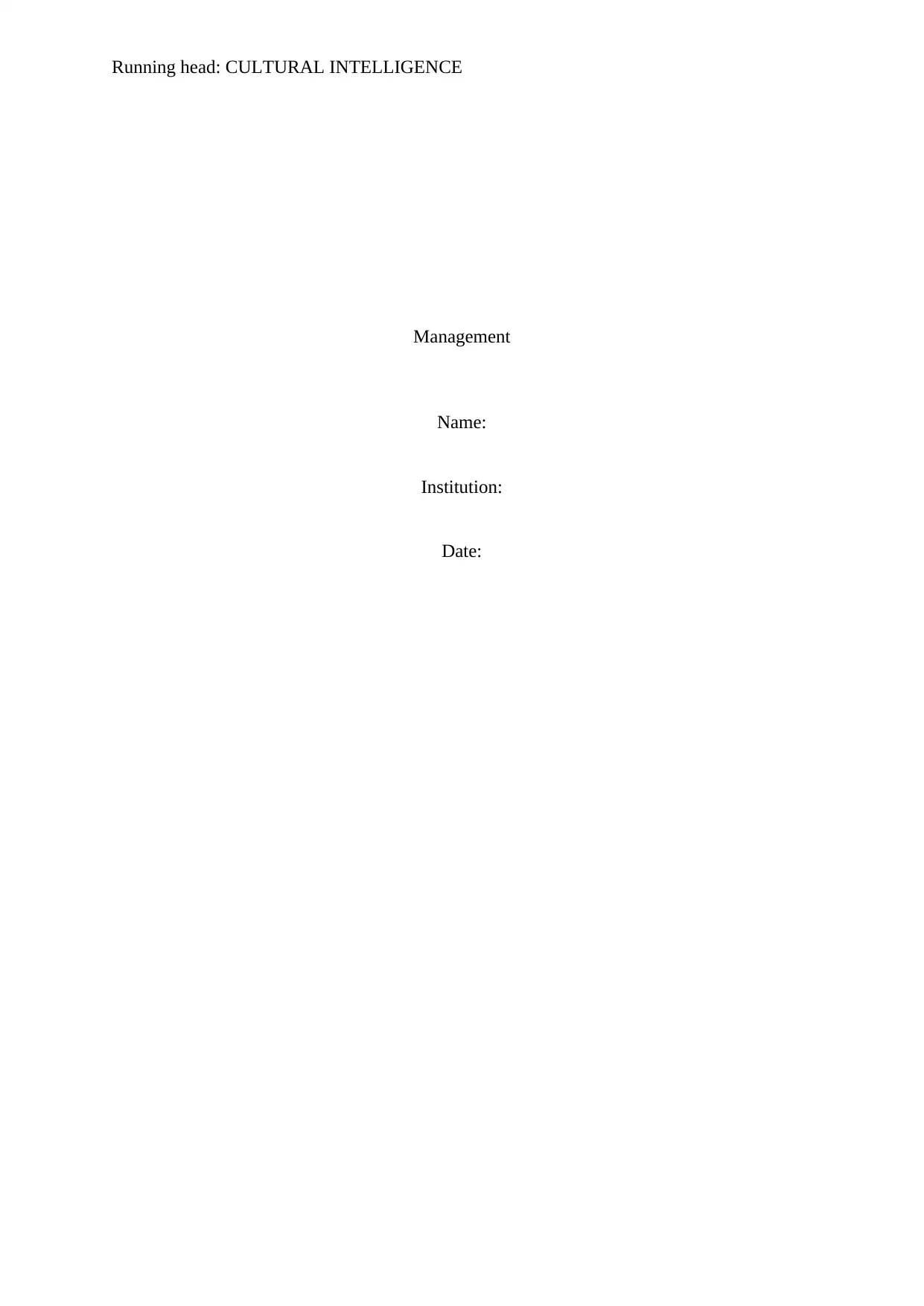
Running head: CULTURAL INTELLIGENCE
Management
Name:
Institution:
Date:
Management
Name:
Institution:
Date:
Paraphrase This Document
Need a fresh take? Get an instant paraphrase of this document with our AI Paraphraser
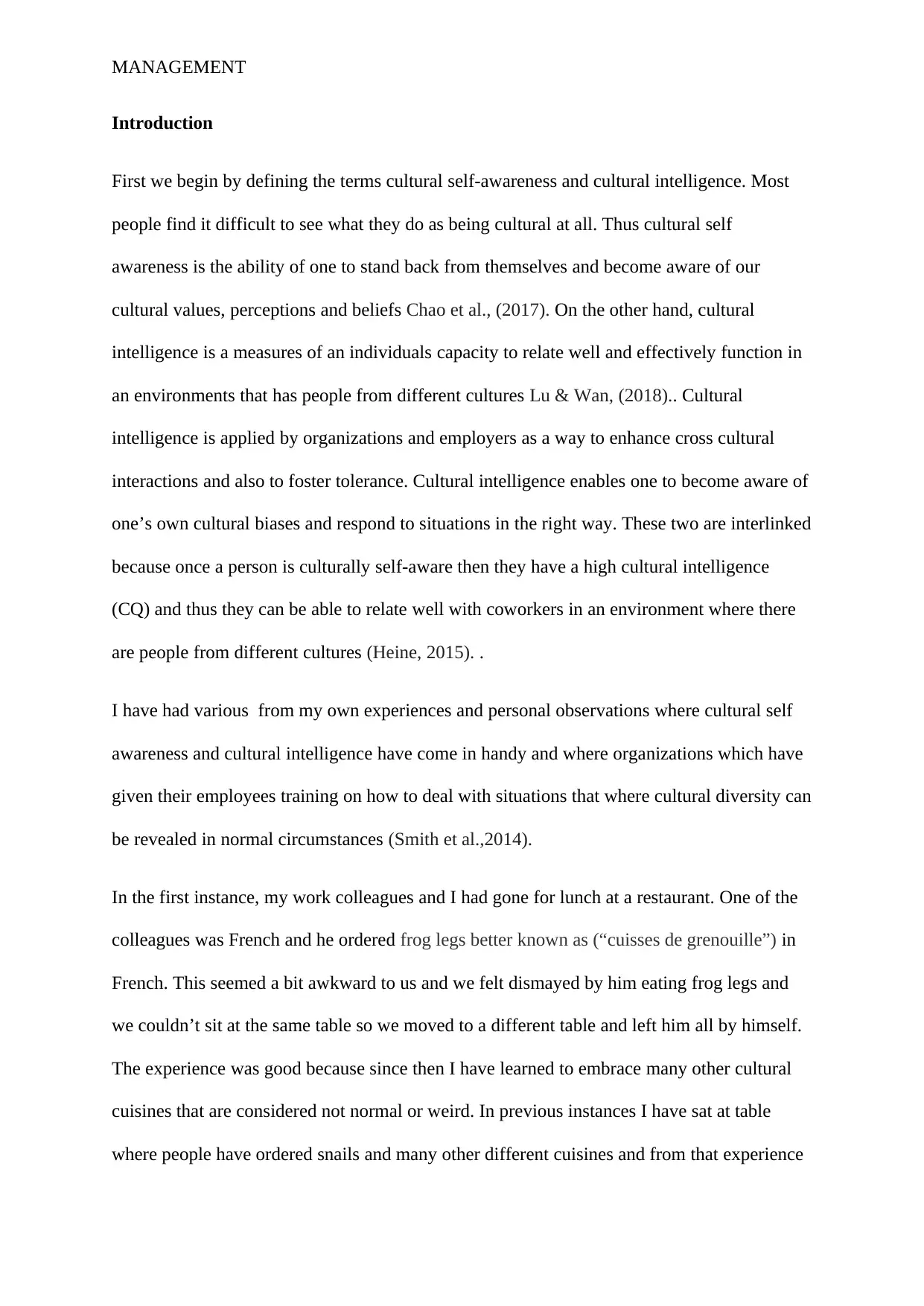
MANAGEMENT
Introduction
First we begin by defining the terms cultural self-awareness and cultural intelligence. Most
people find it difficult to see what they do as being cultural at all. Thus cultural self
awareness is the ability of one to stand back from themselves and become aware of our
cultural values, perceptions and beliefs Chao et al., (2017). On the other hand, cultural
intelligence is a measures of an individuals capacity to relate well and effectively function in
an environments that has people from different cultures Lu & Wan, (2018).. Cultural
intelligence is applied by organizations and employers as a way to enhance cross cultural
interactions and also to foster tolerance. Cultural intelligence enables one to become aware of
one’s own cultural biases and respond to situations in the right way. These two are interlinked
because once a person is culturally self-aware then they have a high cultural intelligence
(CQ) and thus they can be able to relate well with coworkers in an environment where there
are people from different cultures (Heine, 2015). .
I have had various from my own experiences and personal observations where cultural self
awareness and cultural intelligence have come in handy and where organizations which have
given their employees training on how to deal with situations that where cultural diversity can
be revealed in normal circumstances (Smith et al.,2014).
In the first instance, my work colleagues and I had gone for lunch at a restaurant. One of the
colleagues was French and he ordered frog legs better known as (“cuisses de grenouille”) in
French. This seemed a bit awkward to us and we felt dismayed by him eating frog legs and
we couldn’t sit at the same table so we moved to a different table and left him all by himself.
The experience was good because since then I have learned to embrace many other cultural
cuisines that are considered not normal or weird. In previous instances I have sat at table
where people have ordered snails and many other different cuisines and from that experience
Introduction
First we begin by defining the terms cultural self-awareness and cultural intelligence. Most
people find it difficult to see what they do as being cultural at all. Thus cultural self
awareness is the ability of one to stand back from themselves and become aware of our
cultural values, perceptions and beliefs Chao et al., (2017). On the other hand, cultural
intelligence is a measures of an individuals capacity to relate well and effectively function in
an environments that has people from different cultures Lu & Wan, (2018).. Cultural
intelligence is applied by organizations and employers as a way to enhance cross cultural
interactions and also to foster tolerance. Cultural intelligence enables one to become aware of
one’s own cultural biases and respond to situations in the right way. These two are interlinked
because once a person is culturally self-aware then they have a high cultural intelligence
(CQ) and thus they can be able to relate well with coworkers in an environment where there
are people from different cultures (Heine, 2015). .
I have had various from my own experiences and personal observations where cultural self
awareness and cultural intelligence have come in handy and where organizations which have
given their employees training on how to deal with situations that where cultural diversity can
be revealed in normal circumstances (Smith et al.,2014).
In the first instance, my work colleagues and I had gone for lunch at a restaurant. One of the
colleagues was French and he ordered frog legs better known as (“cuisses de grenouille”) in
French. This seemed a bit awkward to us and we felt dismayed by him eating frog legs and
we couldn’t sit at the same table so we moved to a different table and left him all by himself.
The experience was good because since then I have learned to embrace many other cultural
cuisines that are considered not normal or weird. In previous instances I have sat at table
where people have ordered snails and many other different cuisines and from that experience
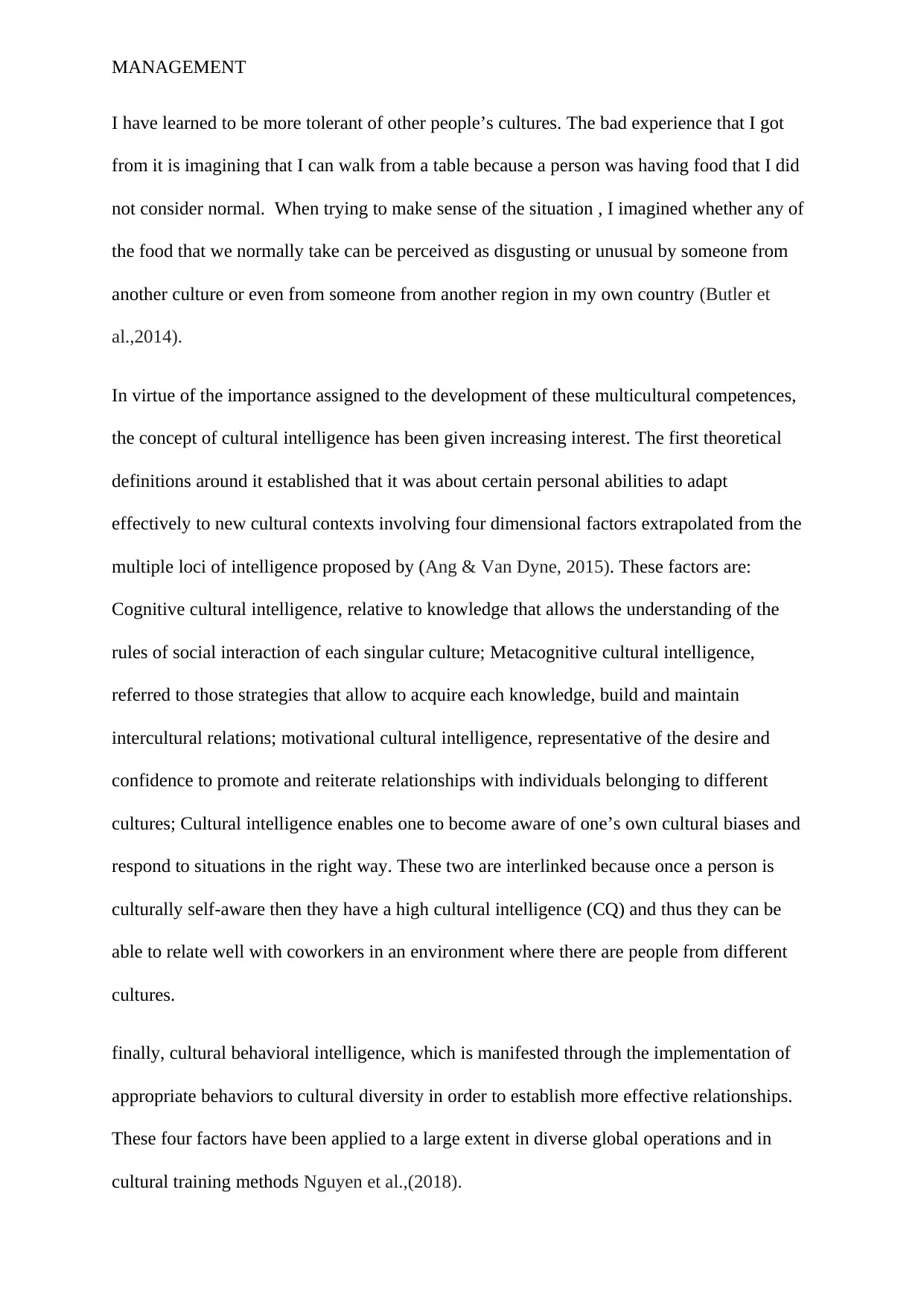
MANAGEMENT
I have learned to be more tolerant of other people’s cultures. The bad experience that I got
from it is imagining that I can walk from a table because a person was having food that I did
not consider normal. When trying to make sense of the situation , I imagined whether any of
the food that we normally take can be perceived as disgusting or unusual by someone from
another culture or even from someone from another region in my own country (Butler et
al.,2014).
In virtue of the importance assigned to the development of these multicultural competences,
the concept of cultural intelligence has been given increasing interest. The first theoretical
definitions around it established that it was about certain personal abilities to adapt
effectively to new cultural contexts involving four dimensional factors extrapolated from the
multiple loci of intelligence proposed by (Ang & Van Dyne, 2015). These factors are:
Cognitive cultural intelligence, relative to knowledge that allows the understanding of the
rules of social interaction of each singular culture; Metacognitive cultural intelligence,
referred to those strategies that allow to acquire each knowledge, build and maintain
intercultural relations; motivational cultural intelligence, representative of the desire and
confidence to promote and reiterate relationships with individuals belonging to different
cultures; Cultural intelligence enables one to become aware of one’s own cultural biases and
respond to situations in the right way. These two are interlinked because once a person is
culturally self-aware then they have a high cultural intelligence (CQ) and thus they can be
able to relate well with coworkers in an environment where there are people from different
cultures.
finally, cultural behavioral intelligence, which is manifested through the implementation of
appropriate behaviors to cultural diversity in order to establish more effective relationships.
These four factors have been applied to a large extent in diverse global operations and in
cultural training methods Nguyen et al.,(2018).
I have learned to be more tolerant of other people’s cultures. The bad experience that I got
from it is imagining that I can walk from a table because a person was having food that I did
not consider normal. When trying to make sense of the situation , I imagined whether any of
the food that we normally take can be perceived as disgusting or unusual by someone from
another culture or even from someone from another region in my own country (Butler et
al.,2014).
In virtue of the importance assigned to the development of these multicultural competences,
the concept of cultural intelligence has been given increasing interest. The first theoretical
definitions around it established that it was about certain personal abilities to adapt
effectively to new cultural contexts involving four dimensional factors extrapolated from the
multiple loci of intelligence proposed by (Ang & Van Dyne, 2015). These factors are:
Cognitive cultural intelligence, relative to knowledge that allows the understanding of the
rules of social interaction of each singular culture; Metacognitive cultural intelligence,
referred to those strategies that allow to acquire each knowledge, build and maintain
intercultural relations; motivational cultural intelligence, representative of the desire and
confidence to promote and reiterate relationships with individuals belonging to different
cultures; Cultural intelligence enables one to become aware of one’s own cultural biases and
respond to situations in the right way. These two are interlinked because once a person is
culturally self-aware then they have a high cultural intelligence (CQ) and thus they can be
able to relate well with coworkers in an environment where there are people from different
cultures.
finally, cultural behavioral intelligence, which is manifested through the implementation of
appropriate behaviors to cultural diversity in order to establish more effective relationships.
These four factors have been applied to a large extent in diverse global operations and in
cultural training methods Nguyen et al.,(2018).
⊘ This is a preview!⊘
Do you want full access?
Subscribe today to unlock all pages.

Trusted by 1+ million students worldwide
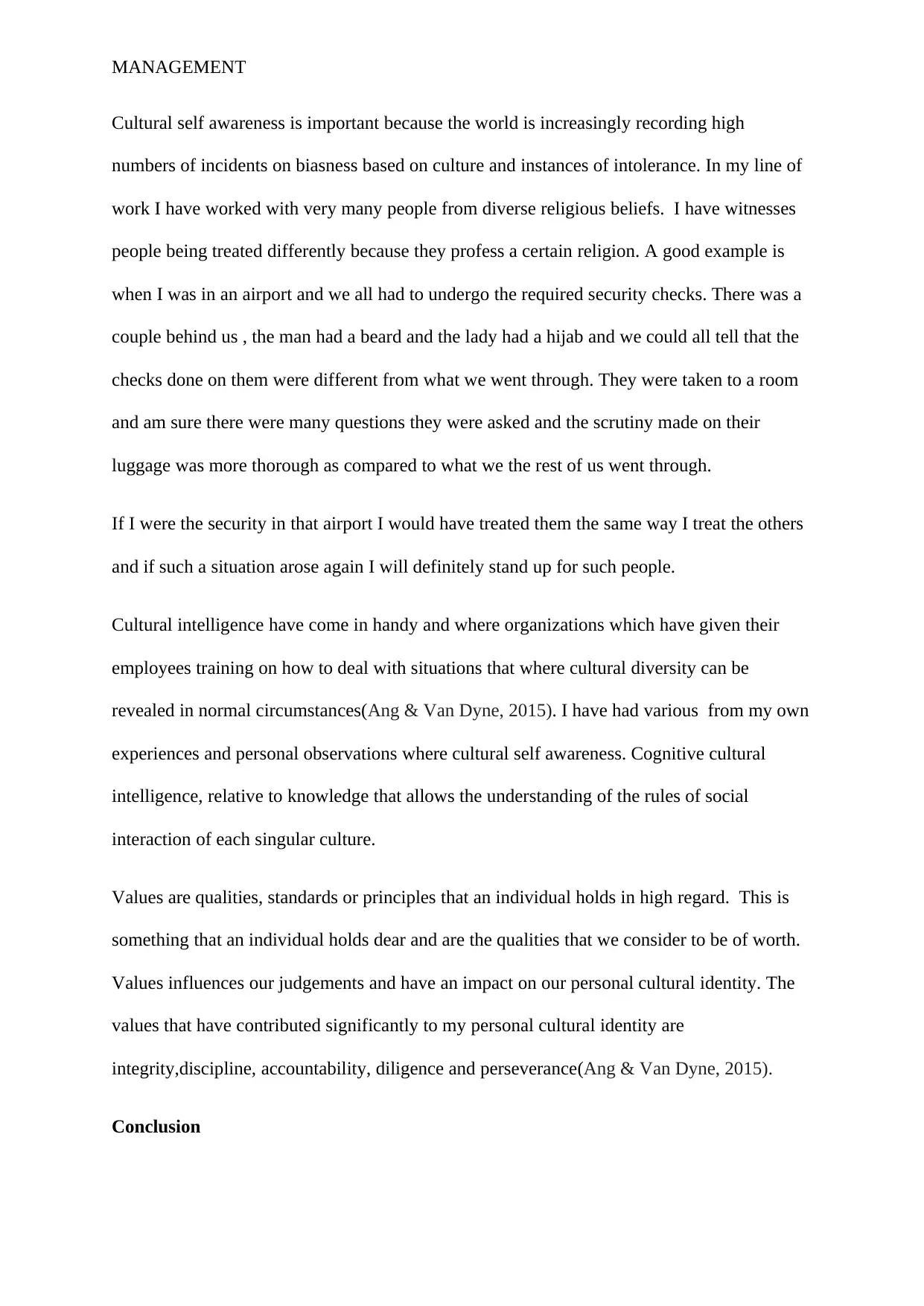
MANAGEMENT
Cultural self awareness is important because the world is increasingly recording high
numbers of incidents on biasness based on culture and instances of intolerance. In my line of
work I have worked with very many people from diverse religious beliefs. I have witnesses
people being treated differently because they profess a certain religion. A good example is
when I was in an airport and we all had to undergo the required security checks. There was a
couple behind us , the man had a beard and the lady had a hijab and we could all tell that the
checks done on them were different from what we went through. They were taken to a room
and am sure there were many questions they were asked and the scrutiny made on their
luggage was more thorough as compared to what we the rest of us went through.
If I were the security in that airport I would have treated them the same way I treat the others
and if such a situation arose again I will definitely stand up for such people.
Cultural intelligence have come in handy and where organizations which have given their
employees training on how to deal with situations that where cultural diversity can be
revealed in normal circumstances(Ang & Van Dyne, 2015). I have had various from my own
experiences and personal observations where cultural self awareness. Cognitive cultural
intelligence, relative to knowledge that allows the understanding of the rules of social
interaction of each singular culture.
Values are qualities, standards or principles that an individual holds in high regard. This is
something that an individual holds dear and are the qualities that we consider to be of worth.
Values influences our judgements and have an impact on our personal cultural identity. The
values that have contributed significantly to my personal cultural identity are
integrity,discipline, accountability, diligence and perseverance(Ang & Van Dyne, 2015).
Conclusion
Cultural self awareness is important because the world is increasingly recording high
numbers of incidents on biasness based on culture and instances of intolerance. In my line of
work I have worked with very many people from diverse religious beliefs. I have witnesses
people being treated differently because they profess a certain religion. A good example is
when I was in an airport and we all had to undergo the required security checks. There was a
couple behind us , the man had a beard and the lady had a hijab and we could all tell that the
checks done on them were different from what we went through. They were taken to a room
and am sure there were many questions they were asked and the scrutiny made on their
luggage was more thorough as compared to what we the rest of us went through.
If I were the security in that airport I would have treated them the same way I treat the others
and if such a situation arose again I will definitely stand up for such people.
Cultural intelligence have come in handy and where organizations which have given their
employees training on how to deal with situations that where cultural diversity can be
revealed in normal circumstances(Ang & Van Dyne, 2015). I have had various from my own
experiences and personal observations where cultural self awareness. Cognitive cultural
intelligence, relative to knowledge that allows the understanding of the rules of social
interaction of each singular culture.
Values are qualities, standards or principles that an individual holds in high regard. This is
something that an individual holds dear and are the qualities that we consider to be of worth.
Values influences our judgements and have an impact on our personal cultural identity. The
values that have contributed significantly to my personal cultural identity are
integrity,discipline, accountability, diligence and perseverance(Ang & Van Dyne, 2015).
Conclusion
Paraphrase This Document
Need a fresh take? Get an instant paraphrase of this document with our AI Paraphraser
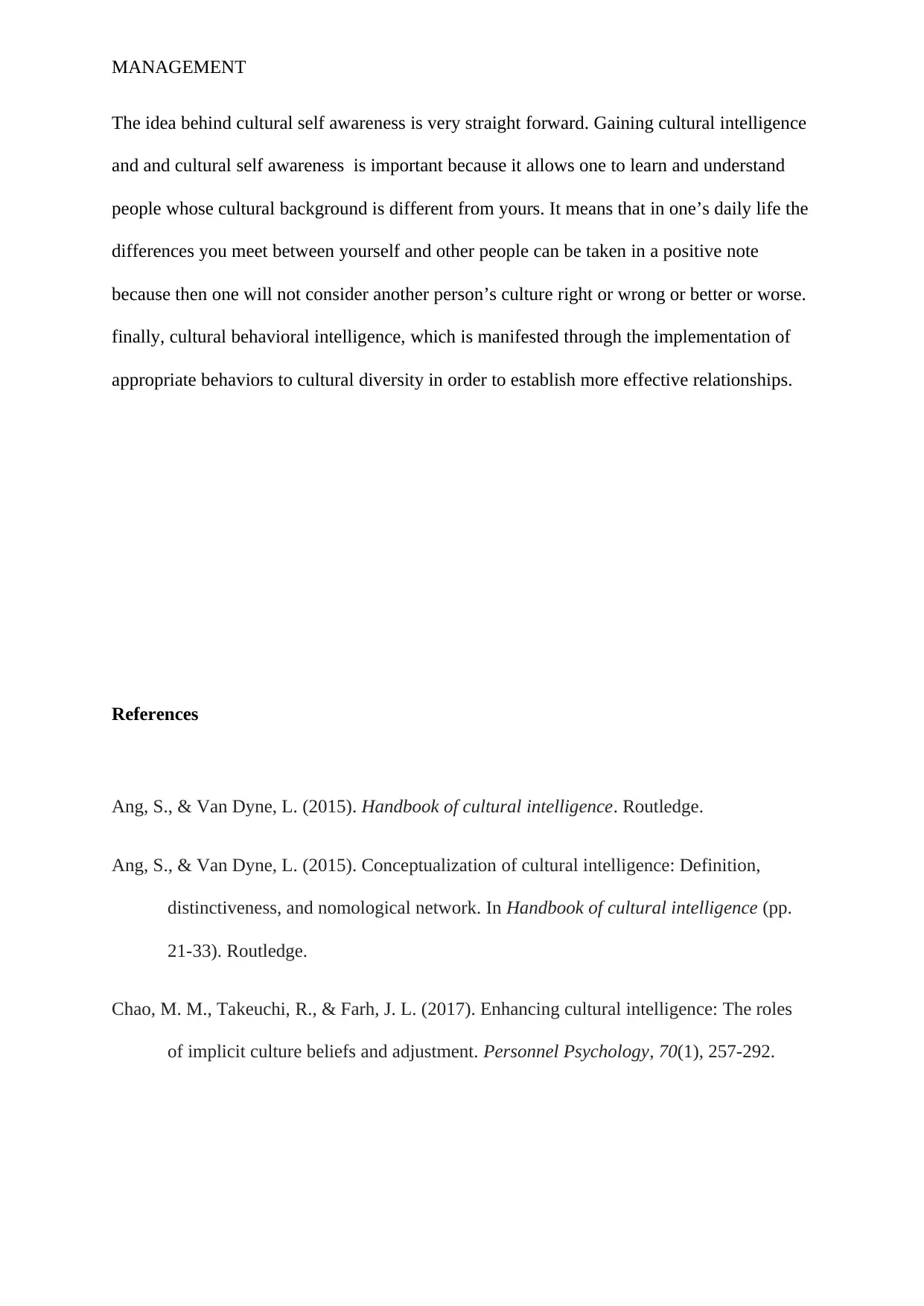
MANAGEMENT
The idea behind cultural self awareness is very straight forward. Gaining cultural intelligence
and and cultural self awareness is important because it allows one to learn and understand
people whose cultural background is different from yours. It means that in one’s daily life the
differences you meet between yourself and other people can be taken in a positive note
because then one will not consider another person’s culture right or wrong or better or worse.
finally, cultural behavioral intelligence, which is manifested through the implementation of
appropriate behaviors to cultural diversity in order to establish more effective relationships.
References
Ang, S., & Van Dyne, L. (2015). Handbook of cultural intelligence. Routledge.
Ang, S., & Van Dyne, L. (2015). Conceptualization of cultural intelligence: Definition,
distinctiveness, and nomological network. In Handbook of cultural intelligence (pp.
21-33). Routledge.
Chao, M. M., Takeuchi, R., & Farh, J. L. (2017). Enhancing cultural intelligence: The roles
of implicit culture beliefs and adjustment. Personnel Psychology, 70(1), 257-292.
The idea behind cultural self awareness is very straight forward. Gaining cultural intelligence
and and cultural self awareness is important because it allows one to learn and understand
people whose cultural background is different from yours. It means that in one’s daily life the
differences you meet between yourself and other people can be taken in a positive note
because then one will not consider another person’s culture right or wrong or better or worse.
finally, cultural behavioral intelligence, which is manifested through the implementation of
appropriate behaviors to cultural diversity in order to establish more effective relationships.
References
Ang, S., & Van Dyne, L. (2015). Handbook of cultural intelligence. Routledge.
Ang, S., & Van Dyne, L. (2015). Conceptualization of cultural intelligence: Definition,
distinctiveness, and nomological network. In Handbook of cultural intelligence (pp.
21-33). Routledge.
Chao, M. M., Takeuchi, R., & Farh, J. L. (2017). Enhancing cultural intelligence: The roles
of implicit culture beliefs and adjustment. Personnel Psychology, 70(1), 257-292.
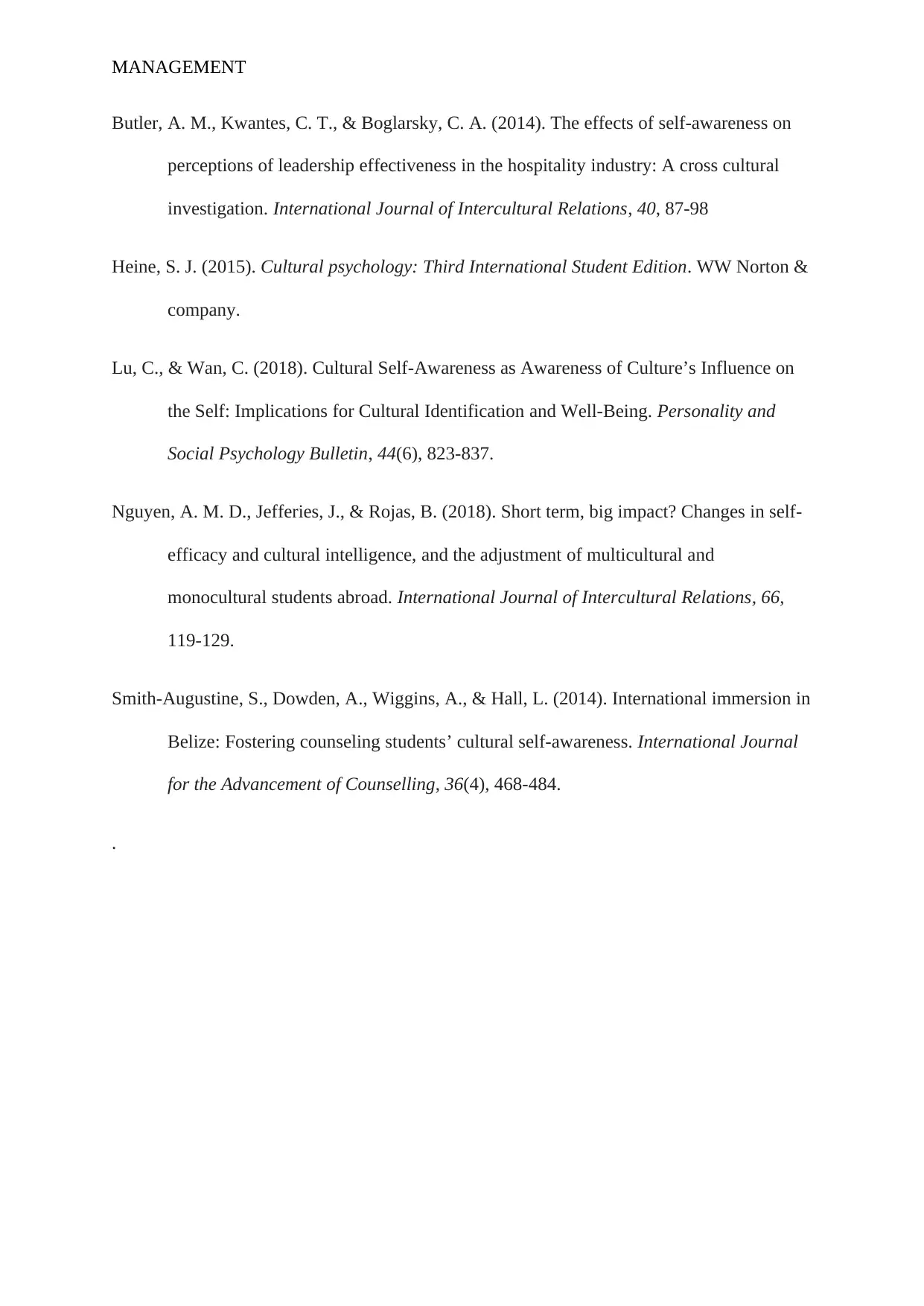
MANAGEMENT
Butler, A. M., Kwantes, C. T., & Boglarsky, C. A. (2014). The effects of self-awareness on
perceptions of leadership effectiveness in the hospitality industry: A cross cultural
investigation. International Journal of Intercultural Relations, 40, 87-98
Heine, S. J. (2015). Cultural psychology: Third International Student Edition. WW Norton &
company.
Lu, C., & Wan, C. (2018). Cultural Self-Awareness as Awareness of Culture’s Influence on
the Self: Implications for Cultural Identification and Well-Being. Personality and
Social Psychology Bulletin, 44(6), 823-837.
Nguyen, A. M. D., Jefferies, J., & Rojas, B. (2018). Short term, big impact? Changes in self-
efficacy and cultural intelligence, and the adjustment of multicultural and
monocultural students abroad. International Journal of Intercultural Relations, 66,
119-129.
Smith-Augustine, S., Dowden, A., Wiggins, A., & Hall, L. (2014). International immersion in
Belize: Fostering counseling students’ cultural self-awareness. International Journal
for the Advancement of Counselling, 36(4), 468-484.
.
Butler, A. M., Kwantes, C. T., & Boglarsky, C. A. (2014). The effects of self-awareness on
perceptions of leadership effectiveness in the hospitality industry: A cross cultural
investigation. International Journal of Intercultural Relations, 40, 87-98
Heine, S. J. (2015). Cultural psychology: Third International Student Edition. WW Norton &
company.
Lu, C., & Wan, C. (2018). Cultural Self-Awareness as Awareness of Culture’s Influence on
the Self: Implications for Cultural Identification and Well-Being. Personality and
Social Psychology Bulletin, 44(6), 823-837.
Nguyen, A. M. D., Jefferies, J., & Rojas, B. (2018). Short term, big impact? Changes in self-
efficacy and cultural intelligence, and the adjustment of multicultural and
monocultural students abroad. International Journal of Intercultural Relations, 66,
119-129.
Smith-Augustine, S., Dowden, A., Wiggins, A., & Hall, L. (2014). International immersion in
Belize: Fostering counseling students’ cultural self-awareness. International Journal
for the Advancement of Counselling, 36(4), 468-484.
.
⊘ This is a preview!⊘
Do you want full access?
Subscribe today to unlock all pages.

Trusted by 1+ million students worldwide
1 out of 6
Related Documents
Your All-in-One AI-Powered Toolkit for Academic Success.
+13062052269
info@desklib.com
Available 24*7 on WhatsApp / Email
![[object Object]](/_next/static/media/star-bottom.7253800d.svg)
Unlock your academic potential
Copyright © 2020–2026 A2Z Services. All Rights Reserved. Developed and managed by ZUCOL.





